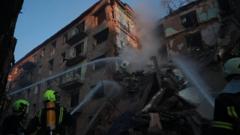In a strategic meeting with Iran’s foreign minister, Putin expresses support for Iran while avoiding direct blame towards Israel and the U.S. amid the ongoing conflict.
Putin Remains Cautious Amid Rising Tensions in Iran-Israel Conflict

Putin Remains Cautious Amid Rising Tensions in Iran-Israel Conflict
Russian President opts for diplomacy over confrontation as he engages with Iranian leadership regarding ongoing hostilities.
Russian President Vladimir V. Putin held a significant meeting with Iran's Foreign Minister Abbas Araghchi at the Kremlin on Monday, marking the first public encounter between top officials from the two nations since Israel commenced its military actions against Iran on June 13, 2025. The deliberations come amidst escalating tensions as Israel continues to target Iranian air defenses, nuclear sites, and military leaders, while Iran retaliates with missile strikes on Israeli targets.
Despite the ferocity of the conflict, the Kremlin has largely remained detached, yet in an apparent shift, Putin declared the Israeli actions as “absolutely unprovoked aggression against Iran,” asserting that it is “unfounded and unjustified,” as per a Kremlin statement. He emphasized Russia's commitment to support the Iranian populace during this turbulent time.
In a bid to mediate the hostilities, Putin mentioned having discussions on the Israel-Iran war with U.S. President Trump, alongside dialogues with leaders from Israel, Iran, and the UAE. There were also communications with Iraqi Prime Minister Mohammed Shia al-Sudani earlier on Monday, indicating Russia's intent to position itself as a stabilizing force in the conflict.
However, Putin refrained from directly condemning the U.S. or Israel for their military actions against Iran, opting instead for a diplomatic tone in stark contrast to Araghchi’s more accusatory remarks, which labeled U.S. and Israeli actions as “aggressive.” Spokesman Dmitri S. Peskov echoed this sentiment, reaffirming Russia's backing for Iran while sidestepping any military or economic commitments that could could incite the Trump administration’s ire or detract from Russian resources allocated in its own engagements, particularly in Ukraine.
When questioned about potential support for bolstering Iranian air defenses, Peskov highlighted that Russia's future actions would depend on Iran's needs, reiterating that Russia had already condemned the strikes and offers to mediate have been articulated: “These are types of support,” he stated.
As developments unfold, the Kremlin's careful balancing act underscores Russia's desire to maintain its influence and alliances while managing complex geopolitical dynamics in the Middle East.























